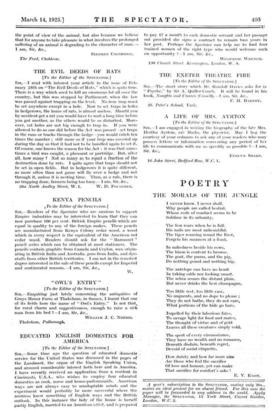THE EVIL DEEDS OF RATS
[To the Editor of the SPECTATOR.] SIR,—I read with interest your article in the issue of Feb- ruary 28th on "The Evil Deeds of R ats," which is quite true. There is a way which used to kill an enormous lot all over the country, but this was stopped by Parliament, when the law was passed against trapping on the level. No iron trap must _ be set anywhere except in a hole. Now to set traps in holes in hedgerows, the home of rats, is almost useless. Should you by accident get a rat you would have to wait a long time before you got another, as the others would be so disturbed. More- over, rat holes are not big enough to trap in. If you were allowed to do as one did before the Act was passed—set traps in the runs or tracks through the hedge--you would catch ten times the number ; still more so if your trap was covered up during the day so that it had not to he handled again to set it. Of course, one knows the reason for the Act : it was that some- times a bird was caught, a pheasant or partridge. But, after all, how many ? Not so many as to equal a fraction of the destruction done by rats. I quite agree that traps should not be set in open fields. But in hedgerows it is quite different, as more often than not game will fly over a hedge and not through it, unless it is nesting time. Then, as a rule, there is no trapping done, farmers being too busy.—I am, Sir, &c.,
26a North Audley Street, W. I. W. D. Four.catat.














































 Previous page
Previous page